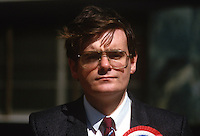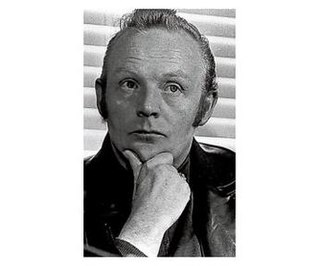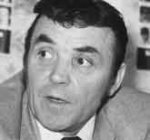Related Research Articles
A loyalist feud refers to any of the sporadic feuds which have erupted almost routinely between Northern Ireland's various loyalist paramilitary groups during and after the ethno-political conflict known as the Troubles broke out in 1969. The feuds have frequently involved problems between and within the Ulster Defence Association (UDA) and the Ulster Volunteer Force (UVF) as well as, later, the Loyalist Volunteer Force (LVF).
Frank McCoubrey is a Unionist politician and loyalist in Northern Ireland, as well as a community activist and researcher. He is a leading member of the Ulster Political Research Group (UPRG) and a member of Belfast City Council, representing the Court area as a Democratic Unionist Party (DUP) councillor. McCoubrey is a native of Highfield, Belfast.

Albert Glenn Barr OBE was a politician from Derry, Northern Ireland, who was an advocate of Ulster nationalism. For a time during the 1970s he straddled both Unionism and Loyalism due to simultaneously holding important positions in the Vanguard Unionist Progressive Party and the Ulster Defence Association.

George Seawright was a Scottish-born unionist politician in Northern Ireland and loyalist paramilitary in the Ulster Volunteer Force. He was assassinated by the Irish People's Liberation Organisation in 1987.

John "Big John" McMichael was a leading Northern Ireland loyalist who rose to become the most prominent and charismatic figure within the Ulster Defence Association (UDA) as the Deputy Commander and leader of its South Belfast Brigade. He was also commander of the organisation's cover name, the "Ulster Freedom Fighters" (UFF), overseeing an assassination campaign against prominent republican figures whose details were included in a notorious "shopping list" derived from leaked security forces documents. The UDA used the UFF name when it wished to claim responsibility for attacks, thus allowing it to remain a legal paramilitary organisation until August 1992 when it was proscribed by the British Government.

John "Jackie" McDonald is a senior Northern Irish loyalist and the incumbent Ulster Defence Association (UDA) brigadier for South Belfast, having been promoted to the rank by former UDA commander Andy Tyrie in 1988, following John McMichael's killing by the Provisional IRA in December 1987. He is also a member of the organisation's Inner Council and the spokesman for the Ulster Political Research Group (UPRG), the UDA's political advisory body.

Tommy Herron was a loyalist from Northern Ireland, and a leading member of the Ulster Defence Association (UDA) until his death in a fatal shooting. Herron controlled the UDA in East Belfast, one of its two earliest strongholds. From 1972, he was the organisation's vice-chairman and most prominent spokesperson, and was the first person to receive a salary from the UDA.
Andrew Tyrie is an Ulster loyalist paramilitary leader who served as commander of the Ulster Defence Association (UDA) during much of its early history. He took the place of Tommy Herron in 1973 when the latter was killed, and led the organisation until March 1988 when an attempt on his life forced him to resign from his command.

James Pratt Craig was an Ulster loyalist paramilitary during The Troubles in Northern Ireland in the latter half of the 20th century, who was a member of the Ulster Defence Association (UDA), and was a command member of its Inner Council. He also ran a criminal large-scale protection racket from the West Belfast Shankill Road area, where he resided. Described by journalist David McKittrick as "Belfast's foremost paramilitary extortionist", Craig allegedly colluded at times with the enemies of the UDA, Irish Republican groups such as the Provisional Irish Republican Army (IRA) and Irish National Liberation Army (INLA), providing them with information on key loyalists which led to their subsequent murders. Aside from controlling rackets and extorting protection money from a variety of businesses, it was claimed that Craig also participated in paramilitary murders.

Tommy "Tucker" Lyttle, was a high-ranking Ulster loyalist during the period of religious-political conflict in Northern Ireland known as "the Troubles". A member of the Ulster Defence Association (UDA) – the largest loyalist paramilitary organisation in Northern Ireland – he first held the rank of lieutenant colonel and later was made a brigadier. He served as the UDA's spokesman as well as the leader of the organisation's West Belfast Brigade from 1975 until his arrest and imprisonment in 1990. According to journalists Henry McDonald and Brian Rowan, and the Pat Finucane Centre, he became a Royal Ulster Constabulary (RUC) Special Branch informer.

Frankie Curry nicknamed "Pigface", was an Ulster loyalist who was involved with a number of paramilitary groups during his long career. A critic of the Northern Ireland peace process, Curry was killed during a loyalist feud.
Alex Kerr was a Northern Irish former loyalist paramilitary. Kerr was a brigadier in the Ulster Defence Association (UDA)'s South Belfast Brigade before becoming one of the two founders of the Loyalist Volunteer Force (LVF). He is no longer active in loyalism.
Joe English is a former Ulster loyalist activist. English was a leading figure in both the Ulster Defence Association (UDA) and the Ulster Democratic Party (UDP) and was instrumental in the early stages of the Northern Ireland peace process. He is a native of the Rathcoole area of Newtownabbey, Northern Ireland. English is a member of the Apprentice Boys of Derry.

Kenneth Gibson was a Northern Irish politician who was the Chairman of the Volunteer Political Party (VPP), which he had helped to form in 1974. He also served as a spokesman and Chief of Staff of the loyalist paramilitary organisation, the Ulster Volunteer Force (UVF).
David "Davy" Fogel, also known as "Big Dave", was a former loyalist and a leading member of the loyalist vigilante Woodvale Defence Association (WDA) which later merged with other groups becoming the Ulster Defence Association (UDA). Born in London, Fogel was a former British soldier who had served in Northern Ireland before marrying a local Belfast woman and settling down with his family in Woodvale, Belfast.
Leonard "Jim" James Anderson 27 May 1931 – 27 June 2019) was a loyalist paramilitary leader from Northern Ireland, who from April to December 1972, was the acting leader of the Ulster Defence Association (UDA) while its commander and the founder of the organisation, Charles Harding Smith was in jail on remand for gun-running. Upon the latter's return, Anderson, together with Harding Smith, was joint chairman of the UDA until he stood down in the spring of 1973. In the battle between Harding Smith and East Belfast brigadier, Tommy Herron for the succession to the leadership, a compromise candidate, Andy Tyrie, was appointed as chairman.
Samuel McCormick was a Northern Irish loyalist who served from 1973 until the 1980s as the brigadier for the Ulster Defence Association's (UDA) East Belfast Brigade. He had taken over the command following the shooting death of its former leader Tommy Herron.
The UDA West Belfast Brigade is the section of the Ulster loyalist paramilitary group, the Ulster Defence Association (UDA), based in the western quarter of Belfast, in the Greater Shankill area. Initially a battalion, the West Belfast Brigade emerged from the local "defence associations" active in the Shankill at the beginning of the Troubles and became the first section to be officially designated as a separate entity within the wider UDA structure. During the 1970s and 1980s the West Belfast Brigade was involved in a series of killings as well as establishing a significant presence as an outlet for racketeering.
Samuel Smyth was a Northern Irish loyalist activist. A founder member of the Ulster Defence Association (UDA) he was the early public face of the movement as the organisation's spokesman, and he later became involved in the group's attempts to politicise. He was assassinated by the Provisional IRA as part of the Troubles. Author Steve Bruce described Smyth as the "sometime editor of the Ulster Militant and a loose cannon who enjoyed an exciting and erratic relationship with the UDA".
Hester Rogers is a Northern Irish former loyalist activist and writer who was a member of the Ulster Defence Association's (UDA) political wing during the period of religious-political conflict known as the Troubles. She headed the UDA's women's department and ran the public relations and administration section at the organisation's headquarters in Gawn Street, off the Newtownards Road. An outspoken critic of strip searching female prisoners, she was a founder and activist for "Justice For Lifers", an organisation which advocated prison reform in Northern Ireland.
References
- 1 2 Wood, Ian S. (2006). Crimes of Loyalty: A History of the UDA. Edinburgh University Press. p.74
- ↑ Henry McDonald & Jim Cusack, UDA - Inside the Heart of Loyalist Terror, Penguin Ireland, 2004, p. 26
- ↑ "Our own leaders let us down". The Sunday Times. Ed Moloney. 4 April 2010. Retrieved 18 June 2011
- ↑ Wood, p.349
- ↑ David Lister & Hugh Jordan, Mad Dog: The Rise and Fall of Johnny Adair and 'C' Company, Mainstream, 2004, p. 82
- 1 2 McDonald & Cusack, UDA, p. 160
- ↑ Wood, p. 79
- ↑ Wood, p. 136
- ↑ McDonald & Cusack, UDA, pp. 159-160